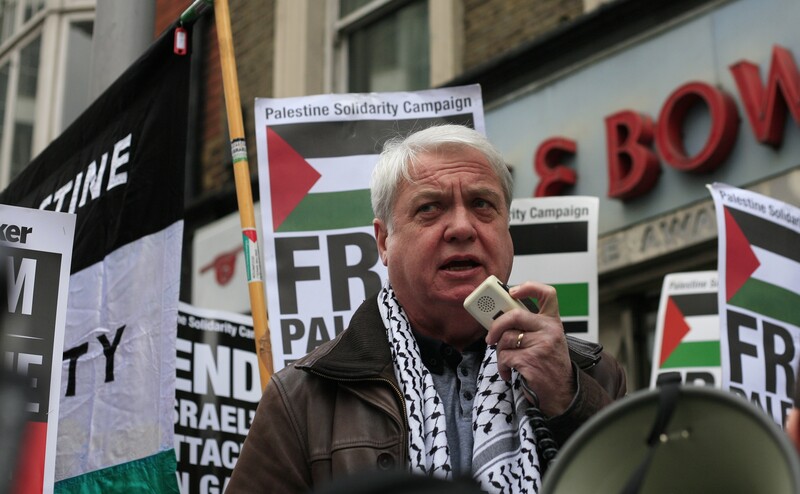A Brief Colonial History Of Ceylon(SriLanka)
Sri Lanka: One Island Two Nations
A Brief Colonial History Of Ceylon(SriLanka)
Sri Lanka: One Island Two Nations
(Full Story)
Search This Blog
Back to 500BC.
==========================
Thiranjala Weerasinghe sj.- One Island Two Nations
?????????????????????????????????????????????????Wednesday, July 12, 2017
Palestine campaigners removed from “terror” database

World-Check forced to concede Hugh Lanning “should never have been included” on “terrorism” database. (PSC)
Asa Winstanley-11 July 2017
After legal action, the Palestine Solidarity Campaign has been removed from a powerful and secretive global banking database on “terrorism” and other crime.
Database entries for PSC and its chair Hugh Lanning were removed after the group’s lawyers put pressure on World-Check, PSC said in a statement last month.
World-Check conceded they “should never have been included on the ‘terrorism’ database, and profiles have been removed on this basis,” PSC said.
But an investigation by The Electronic Intifada has found that dozens more Palestine solidarity groups in the UK alone may have been affected. Many have had bank accounts closed over the last few years.
Ravi Naik, one of PSC’s lawyers said, “Following correspondence between our firm and lawyers for World-Check, it has been accepted by World-Check that our clients should never have been on the database at all, let alone for an unfounded allegation as egregious as terrorism.”
The statement explained that “PSC, Hugh Lanning and World-Check have reached an agreement to address the harm done” to PSC and Lanning’s reputations and to “resolve the matters between them arising from that profile.”
There were no details revealed of any financial settlement.
False allegations
Lanning said he was pleased with the agreement and hoped “the Israeli government and their supporters follow this good example and stop repeating unfounded smears about the PSC and its members.”PSC will “not stand for false allegations made about us and our work,” the group’s director Ben Jamal said. “Campaigns for Palestinian human rights should not be treated differently.”
In February, North London’s Finsbury Park Mosque won an apology from World-Check in the High Court.
The mosque secured damages from the firm after its bank accounts were closed by HSBC in 2014.
World-Check is a global database run by Thomson-Reuters, the company that also owns the Reuters news agency and provides a host of financial and “intelligence” services to corporations and governments.
The firm says World-Check is used by 49 of the world’s 50 top banks to vet prospective customers for suspected financial or other criminal wrongdoing.
But investigative journalists have found that the firm’s information is often sloppy at best and defamatory at worst.
Over the last couple of years, PSC and other Palestine solidarity groups around the world have been forced to move banks, after firms like HSBC and Co-operative closed their accounts with no real explanation.
Right-wing sources
In November 2015, PSC launched a legal case against the Co-operative Bank for closing its account. The bank had refused to explain, citing only their lack of “risk appetite.”In February 2016, a Vice News investigation revealed that PSC had been listed on the World-Check database under its “terrorism” category.
PSC responded that “World-Check’s sources appear to be right-wing websites and blogs,” including the Investigative Project on Terrorism.
That group was founded by Steven Emerson, one of the world’s leading players in the lucrative Islamophobia industry.
In 2015, Emerson was called a “complete idiot” by the UK’s then prime minister for falsely telling Fox News that the English city of Birmingham was a “no-go zone” for non-Muslims.
In October last year the Bank of Ireland closed the Ireland Palestine Solidarity Campaign’s account, again citing only “risk appetite.”
Opaque
An investigation by The Electronic Intifada last year found that at least 30 Palestine solidarity groups in the UK had had bank accounts closed, usually for for vague “risk appetite” reasons.But due to World-Check’s totally opaque operations, it was not possible to independently confirm that the database had been behind the closures.
World-Check’s terms and conditions stipulate that its users are banned from disclosing anything in the database to anyone else – even to those actually listed in it.
Thomson-Reuters told journalist Peter Oborne that “we don’t allow media access” to the database.
When in August 2015 the treasurer of Palestine solidarity group ISM London asked why the Co-operative Bank was shutting down its account, she was told, “I’m not at liberty to discuss that information with you, because it’s confidential” – even to the holder of the account.
Jacinta Kent told The Electronic Intifada last year that the bank said, “we are not obliged to disclose the criteria we use when assessing our risk policies” but “I can assure you our decision is not based on the conduct of your account.”
Tip of the iceberg?
Several Palestine groups with closed accounts contacted by The Electronic Intifada for comment last year declined to speak on the record for fear of further spreading the defamations that had apparently prompted the closure of their accounts.All this is likely to be the “tip of the iceberg” according to Tom Keatinge, a former banker and director of the Centre for Financial Crime at the Royal United Services Institute, a British think tank.
He told The Electronic Intifada that “victims have [often] not made a public noise about it.” They felt that “shouting about it was probably not going to help them get a new bank account somewhere else.”
According to Keatinge, removal from World-Check may not mean the end of problems.
“Once you’re in World-Check, even if World-Check takes you out, I think you’re in trouble,” he said. “There’s no real right to be forgotten,” he explained, “the bank still remembers you.”


